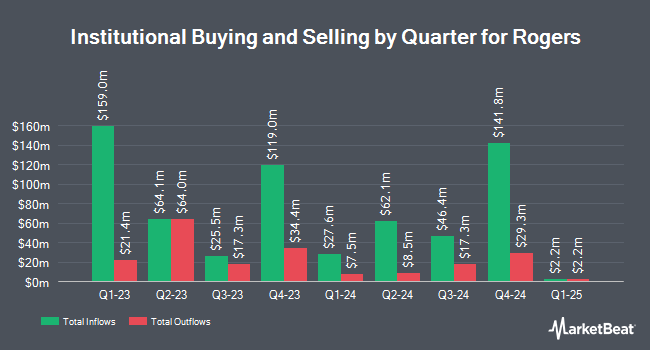Charles Schwab Investment Management Inc. increased its stake in shares of Rogers Co. (NYSE:ROG - Free Report) by 5.8% in the fourth quarter, according to the company in its most recent 13F filing with the Securities and Exchange Commission (SEC). The fund owned 242,914 shares of the electronics maker's stock after buying an additional 13,311 shares during the quarter. Charles Schwab Investment Management Inc. owned about 1.30% of Rogers worth $24,682,000 at the end of the most recent quarter.
A number of other institutional investors have also recently added to or reduced their stakes in the stock. KBC Group NV grew its stake in shares of Rogers by 54.5% in the third quarter. KBC Group NV now owns 669 shares of the electronics maker's stock worth $76,000 after purchasing an additional 236 shares in the last quarter. FMR LLC grew its stake in shares of Rogers by 83.1% in the third quarter. FMR LLC now owns 2,309 shares of the electronics maker's stock worth $261,000 after purchasing an additional 1,048 shares in the last quarter. SG Americas Securities LLC bought a new position in shares of Rogers in the fourth quarter worth $286,000. Procyon Advisors LLC grew its stake in shares of Rogers by 11.9% in the fourth quarter. Procyon Advisors LLC now owns 3,108 shares of the electronics maker's stock worth $316,000 after purchasing an additional 331 shares in the last quarter. Finally, Hedges Asset Management LLC grew its stake in shares of Rogers by 36.5% in the fourth quarter. Hedges Asset Management LLC now owns 3,550 shares of the electronics maker's stock worth $361,000 after purchasing an additional 950 shares in the last quarter. 96.02% of the stock is currently owned by institutional investors.
Rogers Stock Performance
Shares of NYSE:ROG traded down $2.47 on Friday, hitting $72.06. The company's stock had a trading volume of 437,120 shares, compared to its average volume of 140,608. Rogers Co. has a 12 month low of $71.63 and a 12 month high of $134.07. The company has a market capitalization of $1.33 billion, a price-to-earnings ratio of 51.11 and a beta of 0.56. The stock's 50-day moving average is $86.55 and its two-hundred day moving average is $97.77.
Rogers (NYSE:ROG - Get Free Report) last released its quarterly earnings results on Wednesday, February 19th. The electronics maker reported $0.46 earnings per share (EPS) for the quarter, topping the consensus estimate of $0.43 by $0.03. The company had revenue of $192.20 million during the quarter, compared to analysts' expectations of $191.75 million. Rogers had a return on equity of 3.98% and a net margin of 3.14%. During the same quarter in the prior year, the business posted $0.60 earnings per share. Equities analysts expect that Rogers Co. will post 3.57 earnings per share for the current fiscal year.
About Rogers
(
Free Report)
Rogers Corporation engages in the design, development, manufacture, and sale of engineered materials and components worldwide. It operates through Advanced Electronics Solutions (AES), Elastomeric Material Solutions (EMS), and Other segments. The AES segment offers circuit materials, ceramic substrate materials, busbars, and cooling solutions for applications in electric and hybrid electric vehicles (EV/HEV), wireless infrastructure, automotive, renewable energy, aerospace and defense, mass transit, industrial, connected devices, and wired infrastructure.
Recommended Stories

Before you consider Rogers, you'll want to hear this.
MarketBeat keeps track of Wall Street's top-rated and best performing research analysts and the stocks they recommend to their clients on a daily basis. MarketBeat has identified the five stocks that top analysts are quietly whispering to their clients to buy now before the broader market catches on... and Rogers wasn't on the list.
While Rogers currently has a Hold rating among analysts, top-rated analysts believe these five stocks are better buys.
View The Five Stocks Here
Options trading isn’t just for the Wall Street elite; it’s an accessible strategy for anyone armed with the proper knowledge. Think of options as a strategic toolkit, with each tool designed for a specific financial task. Get this report to learn how options trading can help you use the market’s volatility to your advantage.
Get This Free Report
Like this article? Share it with a colleague.
Link copied to clipboard.